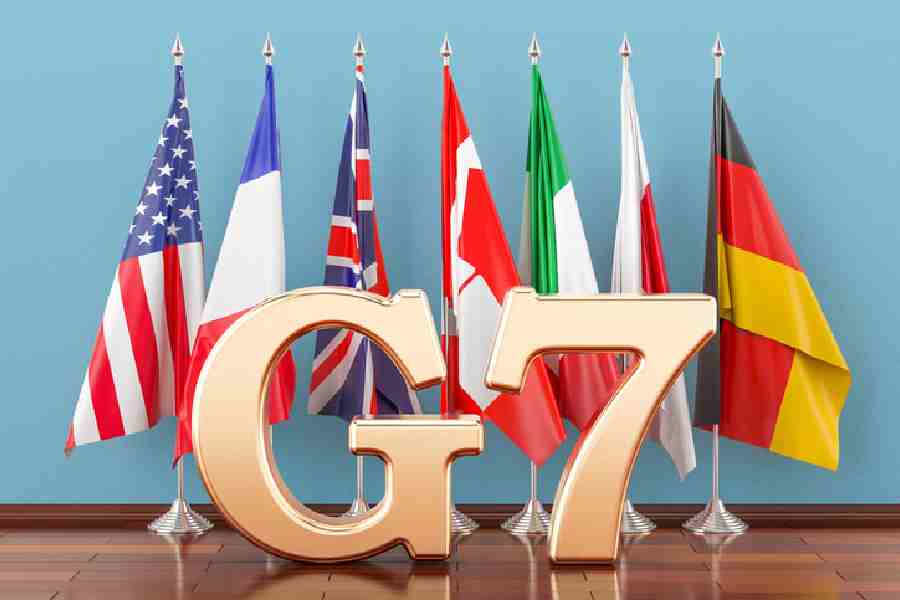Six of the Group of Seven leaders discussed Russia's war in Ukraine and the Israel-Iran conflict but failed to reach major agreements on those and many other top issues — wrapping up a summit that was forced to try and show how the wealthy nations' club might still shape global policy despite the early departure of US President Donald Trump.
Canadian Prime Minister Mark Carney and his counterparts from the UK, France, Germany, Italy and Japan were joined during Tuesday's final sessions by Ukrainian President Volodymyr Zelenskyy and NATO chief Mark Rutte.
“We need support from allies and I'm here,” Zelenskyy said, before adding, “We are ready for the peace negotiations, unconditional ceasefire. I think it's very important. But for this, we need pressure.”
The remaining leaders agreed to jointly attempt to combat what they called non-market policies that could jeopardize global access to critical minerals. They also pledged to limit the downsides of artificial intelligence on jobs and the environment, while still embracing the potential of the “technological revolution.”
There was consensus on other issues, but though the summit was meant to showcase unity on top global concerns, no joint statement on the conflict in Ukraine was released.
Zelenskyy had been set to meet with Trump while world leaders were gathering in the Canadian Rocky Mountain resort of Kananaskis, but that was scrapped. The US also previously signed an agreement granting American access to Ukraine's vast mineral resources.
A senior Canadian official said the US opposed a joint statement on Ukraine amid its efforts to promote negotiations with Russia. The official said it only became clear during the summit's first day on Monday that there wouldn't be a joint statement — though other attendees suggested no consensus agreement was seriously on the table.
The official spoke on condition of anonymity due to not being authorized to discuss summit deliberations.
In Trump's absence, the remaining six leaders held an extensive session on Ukraine. Lacking unanimity, individual leaders also met with Zelenskyy to reassure him of their support.
The summit also was largely overshadowed by a showdown over Iran's nuclear program that could escalate. Israel launched an aerial bombardment campaign against Iran, and Iran has hit back with missiles and drones.
French President Emmanuel Macron warned against the US and other powers pushing for regime change in Iran, suggesting it could destabilize the greater Middle East.
"I believe the greatest mistake today would be to pursue regime change in Iran through military means, as that would lead to chaos,” Macron said.
Before leaving, Trump joined the other leaders in issuing a statement saying Iran “can never have a nuclear weapon” and calling for a “de-escalation of hostilities in the Middle East, including a ceasefire in Gaza.” Getting unanimity — even on a short and broadly worded statement — was a modest measure of success.
Macron said Carney fulfilled his mission as G7 host by preserving the unity of the multilateral organization. “We shouldn't ask the Canadian presidency to resolve every issue on earth today. That would be unfair,” said Macron, who will host the G7 next year.
Carney said in his final remarks Tuesday evening that Trump's early exit was about the “extraordinary” situation in the Middle East, not anything that occurred during the summit.
“There was no problem,” Canada's prime minister said. “Mr. Trump felt it was better to be in Washington, and I can understand that.”
Carney said Canada would impose new economic sanctions against Russia and was releasing its own statement offering “unwavering support for a secure and sovereign Ukraine.” Asked if the US pushed to soften any possible joint statement from the gathered leaders on Ukraine, Carney said he consulted with Trump while preparing the language his own country used.
Still, Trump's departure only served to heighten the drama of a world on the verge of several firestorms — and of a summit deprived early of its most-watched world leader.
“We did everything I had to do at the G7,” Trump said while flying back to Washington. But things were getting awkward even before he left.
After the famous photo from the G7 in 2018 featured Trump and then-German Chancellor Angela Merkel displaying less-than-friendly body language, this year's edition included a dramatic eye-roll by Italian Prime Minister Giorgia Meloni as French President Emmanuel Macron whispered something in her ear during a Monday roundtable.










